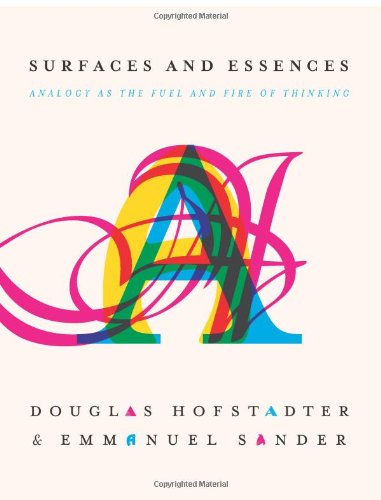
Surfaces and Essences
Analogy as the Fuel and Fire of Thinking
کتاب های مرتبط
- اطلاعات
- نقد و بررسی
- دیدگاه کاربران
نقد و بررسی

March 4, 2013
Not cold reason but a profusion of metaphorical similarities let us understand the world, according to this distended, unfocused treatise on conceptual thought. Cognitive scientists Hofstadter (Gödel, Escher, Bach) and Sander explore the interesting though not startling idea that people rely on analogies drawn from past experience—in words, conversation, cultural assumptions, and ideologies—to make sense of novel situations and discover hidden, abstract commonalities. The authors apply this idea to everything from a child’s generalization from “Mommy” to motherhood to the falling-dominoes analogy drawn during the Vietnam War. They develop some fascinating insights on, for example, the simple analogies underlying Einstein’s theories of relativity, but, unfortunately, the authors lack the good analogist’s nose for concision. More natural history than rigorous scientific analysis, their argument proceeds by cataloging countless analogical specimens and dissecting their meanings at luxuriant length. Never content with a single pithy example where 20 repetitive ones will do, they bludgeon readers with belabored erudition, tiresome overexplication—five pages on the phrase, “Me, too!”—and ponderous rhetorical japes, including a 27-page Socratic dialogue. (“Good grief,—Anna, are you implying that categorization and analogy-making are exactly the same thing?”) The result is an annoyingly high ratio of gratuitous surface detail to essential information. 10 b&w illus.

Starred review from March 1, 2013
How do we know what we know? How do we know at all? With an enjoyable blend of hard science and good storytelling, Hofstadter (I Am a Strange Loop, 2007, etc.) and French psychologist Sander tackle these most elusive of philosophical matters. The authors write that "each concept in our mind owes its existence to a long succession of analogies made unconsciously over many years, initially giving birth to the concept and continuing to enrich it over the course of our lifetime." The word "band," for instance, can mean many things, from an invisible set of wavelengths to a wedding ring to the Beatles; each of those designations forms by analogy to the others, a process made more complex by virtue of the fact that words, even the most ordinary of them, "don't have just two or three but an unlimited number of meanings." Given all that, it is hardly surprising that one man's meat is another's poison--and therein lies the complement to analogy formation, "the very lifeblood of cognition," namely classification or categorization, with the ancillary process of abstraction (whence, for instance, the category "non-square rectangle," containing eight subcategories of rhombuses, parallelograms and so forth). Hofstadter's works are never easy reading, and this one is no different, chockablock full of words such as "zeugmaticity" and "factorization" and with plenty of math to daunt the less than numerate. Yet it's worth sticking with his long argument, full of up-to-date cognitive science and, at the end, a beguiling look at what the theory of relativity owes to analogy. Certainly not for all readers, but first-rate popular science: difficult but rewarding.
COPYRIGHT(2013) Kirkus Reviews, ALL RIGHTS RESERVED.

May 15, 2013
Analogy and human thought are the subject of this accessible work by Hofstadter (cognitive and computer science, Indiana Univ. Bloomington) and Sander (psychology, Univ. of Paris), who argue that analogies are the basis of our ability to form concepts, ranging from the very simple (e.g., comparing a heart to a pump) to the very complex (e.g., Einstein's quantum theory of light). According to the authors, recognizing the similarities among things allows us to make connections between concepts and categories of thought that drive ideas toward certain conclusions by permitting us to interpret and act in new situations. Hofstadter and Sander explicate how analogies--whether simple, complex, or manipulative--are instrumental in our ability to make sense of the world and one another. VERDICT Like Hofstadter's Pulitzer Prize-winning Godel, Escher, Bach, this work executes, from a very complex thesis, an understanding by general readers while also appealing to specialists in philosophy of mind and cognitive science.--Scott Duimstra, Capital Area Dist. Lib., Lansing, MI
Copyright 2013 Library Journal, LLC Used with permission.

























دیدگاه کاربران